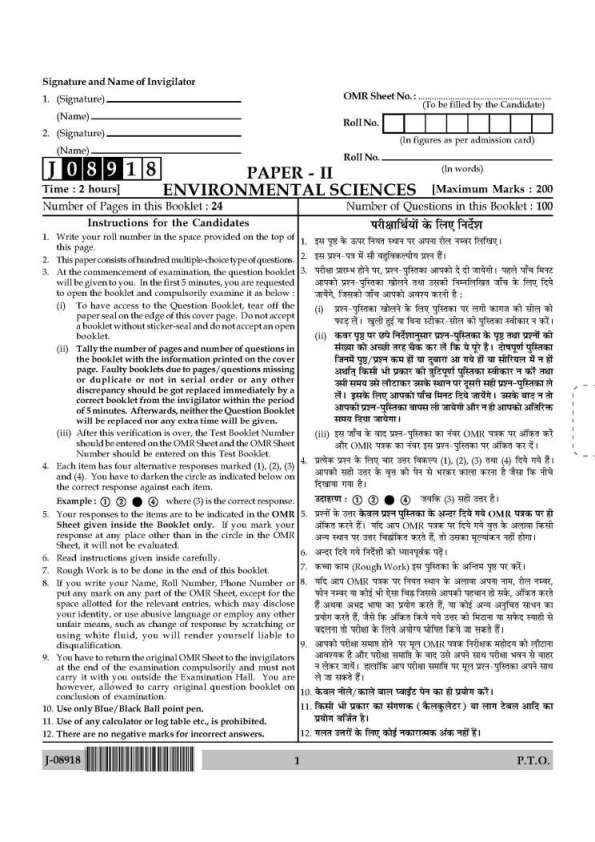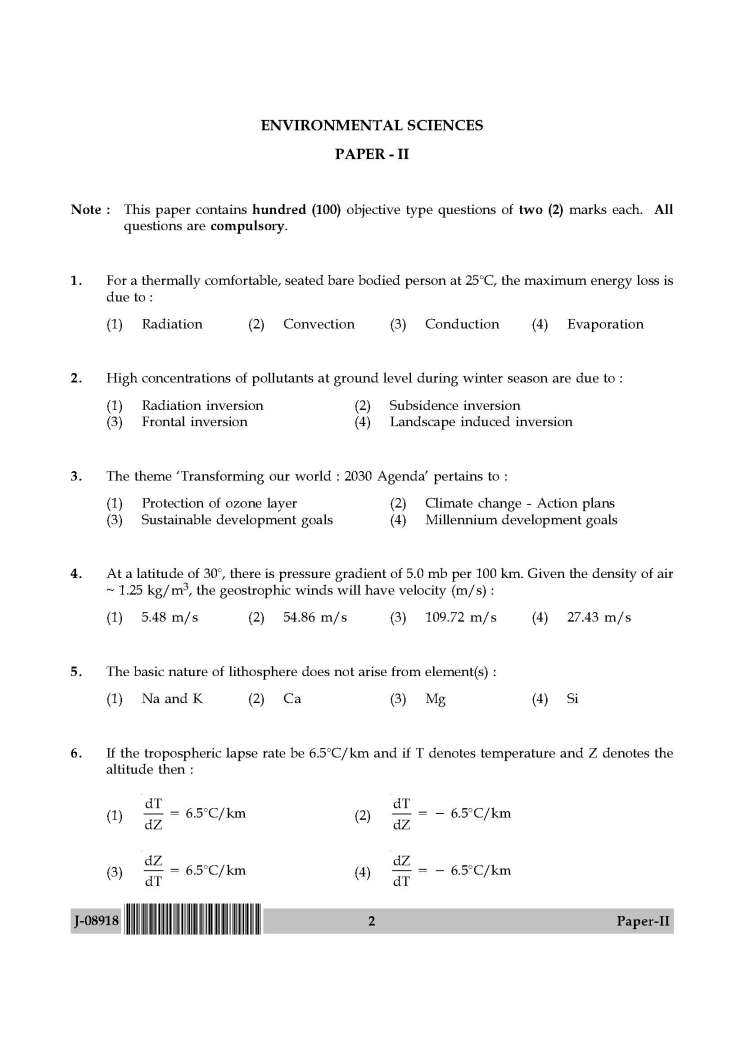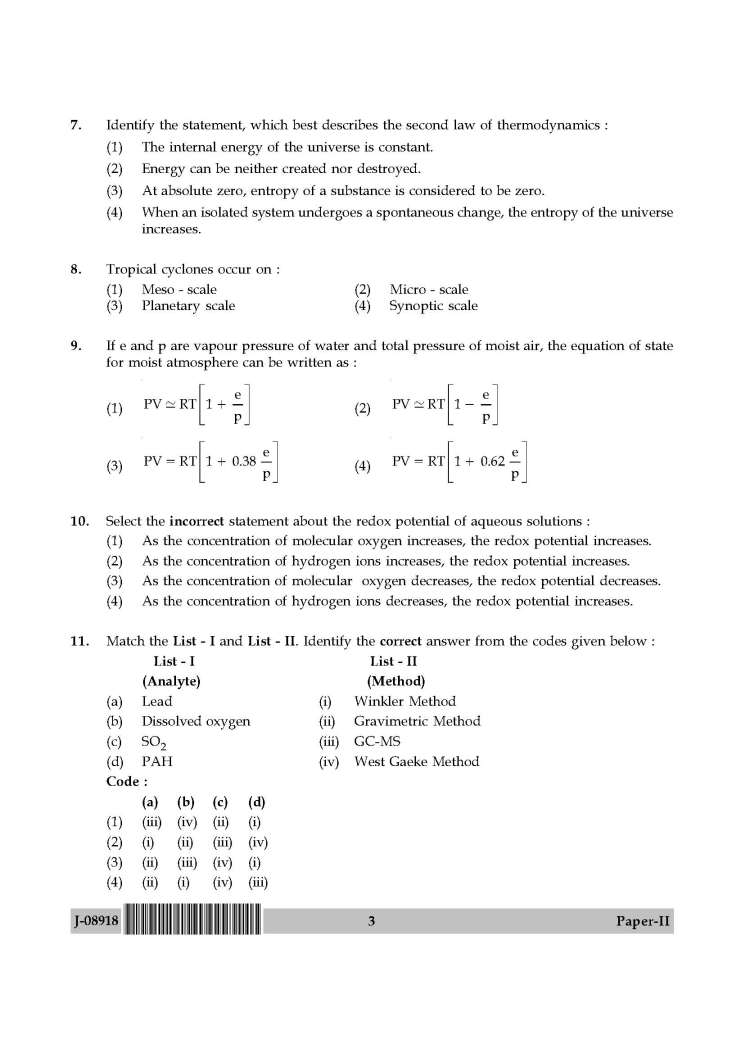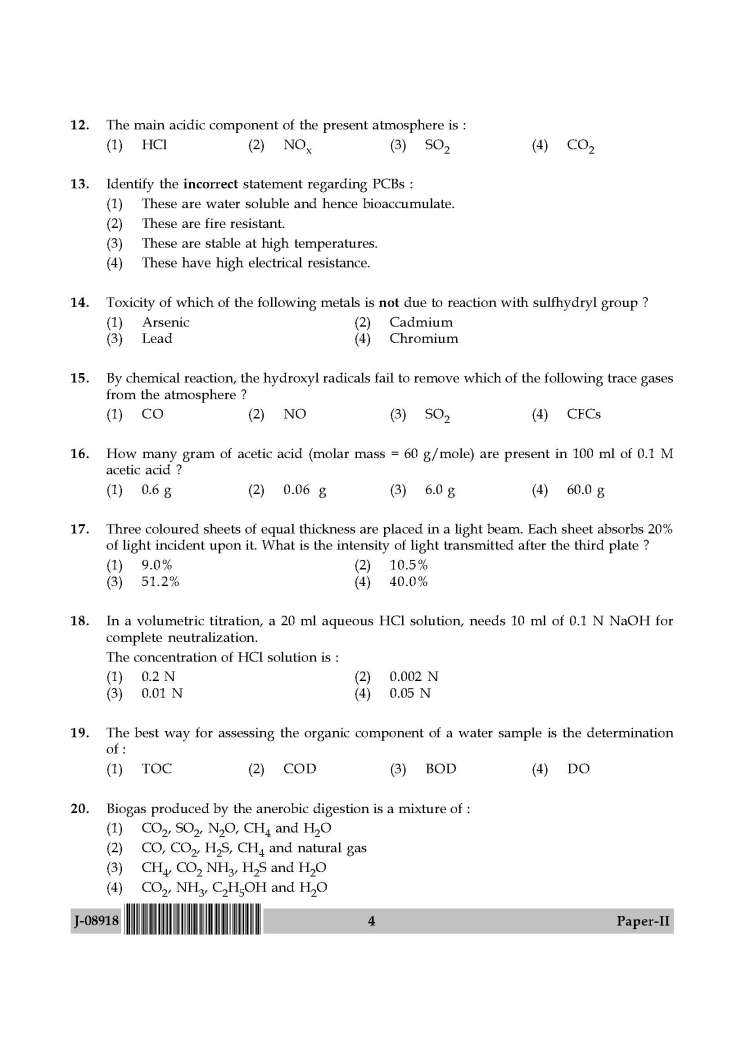|
#1
| |||
| |||
|
Tell me the procedure of get the syllabus of Environmental Studies of UGC because I need of its syllabus so want to get it from net so please tell me. You need UGC NET Environmental Science syllabus, here I am giving; Unit – I : Definition, principles and scope of Environmental Science. Earth, Man and Environment. Ecosystems, Pathways in Ecosystems. Physico-chemical and Biological factors in the Environment. Geographical classification and zones. Structure and composition of atmosphere, hydrosphere, lithosphere and biosphere. Mass and Energy transfer across the various interfaces, material balance. First and Second law of thermodynamics, heat transfer processes. Scale of Meteorology, pressure, temperature, precipitation, humidity, radiation and wind. Atmospheric stability, inversions and mixing heights, windroses. Natural resources, conservation and sustainable development. Unit – II : Fundamentals of Environmental Chemistry : Stochiometry, Gibb’s energy, Chemical potential, chemical equilibria, acid base reactions, solubility product, solubility of gases in water, the carbonate system, unsaturated and saturated hydrocarbons, radionuclides. Chemical composition of Air : Classification of elements, chemical speciation. Particles, ions and radicals in the atmosphere. Chemical processes for formation of inorganic and organic particulate matter. Thermochemical and photochemical reactions in the atmosphere. Oxygen and ozone chemistry, Chemistry of air pollutants, Photochemical smog. Water Chemistry : Chemistry of water, concept of DO, BOD, COD, sedimentation, coagulation, filtration, Redox potential. Soil Chemistry : Inorganic and organic components of soil, Nitrogen pathways and NPK in soils. Toxic Chemicals in the environment – Air, Water : Pesticides in water. Biochemical aspects of Arsenic, Cadmium, Lead, Mercury, Carbon Monoxide, Os and PAN Pesticides, Insecticides, MIC, carcinogens in the air. Principles of Analytical Methods : Titrimetry, Gravimetry, Colourimetry, Spectrophotometry, Chromatography, Gas Chromatography, Atomic Absorption Spectrophotometry, GLC, HPLC, Electrophoresis. X – ray fluorescence, X – ray diffraction, Flame photometry. Unit – III : Definition, Principles and scope of ecology, Human ecology and Human settlement, Evolution, Origin of life and speciation. Ecosystems : Structure and functions, Abiotic and Biotic components, energy flows, Food chains, Food web, Ecological pyramids, types and diversity. Ecological Succession, Population, Community ecology and Parasitism, Prey – predator relationships. Common flora and fauna in India : Aquatic : Phytoplankton, Zooplankton and Macrophytes. Terrestrial : Forests Endangered and Threatened Species : Biodiversity and its conservation : Definition, ‘Hotspot’s of Biodiversity, Strategies for Biodiversity conservation. National Parks and Sanctuaries. Gene pool. Microflora of Atmosphere : Air Sampling techniques. Identification of aeroallergens. Air – borne diseases and allergies. Environmental Biotechnology : Fermentation Technology, Vermiculture technology, Biofertilizer technology. Unit – IV : Environmental Geosciences : Fundamental concepts. The earth systems and Biosphere : Conservation of matter in various geospheres – lithosphere, hydrosphere, atmosphere and biosphere. Energy budget of the earth. Earth’s thermal environment and seasons. Ecosystems flow of energy and matter. Coexistence in communities-food webs., Earths’major ecosystems terrestrial and aquatic. General relationship between landscape, biomes and climate. Climates of India, Indian Monsoon, El Nino, Droughts. Tropical cyclones and Western Disturbances. Earth’s Processes and Geological Hazards : Earths processes; concept of residence, time and rates of natural cycles. Catastrophic geological hazards. Study of floods, landslides, earthquakes, volcanism and avalanche. Prediction and perception of the hazards and adjustments to hazardous activities. Mineral Resources and Environment : Resources and Reserves, Minerals.and Population. Oceans as new areas for exploration of mineral resources. Ocean ore and recycling of resources. Environmental impact of exploitation, processing and smelting of minerals. Water Resources and Environment : Global Water Balance. Ice sheets and fluctuations of sea levels. Origin and composition of seawater. Hydpological cycle. Factors influencing the surface water. Types of water. Resources of oceans. Ocean pollution by toxic wastes. Human use of surface and groundwaters. Groundwater pollution. Landuse Planning : The landuse plan. Soil surveys in relation to landuse planning. Methods of site selection and evaluation. Environmental Geochemistry : Concept of major, trace and REE. Classification of trace elements, Mobility of trace elements, Geochemical cycles. Biogeochemica! factors in environmental health. Human use, trace elements and health. Possible effects of imbalance of some trace elements. Diseases induced by human use of land. Principles of Remote sensing and its application of Environmental Sciences. Application of GIS in Environmental Management. Unit – V : Sun as source of energy; solar radiation and its spectral characteristics; Fossil fuels-classification, composition, physico – chemical characteristics and energy content of coal, petroleum and natural gas. Principles of generation of hydroelectric power, tidal, Ocean Thermal Energy Conversion, wind, geothermal energy; solar collectors, photovoltaics, solar ponds; nuclear energy – fission and fusion; magnetohydrodynamic power, bio-energy-energy from biomass and biogas, anaerobic digestion; energy use pattern in different parts of the world. Environmental implication of energy use; C02 emissions, global warming; air and thermal pollution; radioactive waste and radioactivity from nuclear reactors; impacts of large-scale exploitation of Solar, Wind, Hydro and Ocean energy. Unit – VI : Air : Natural and anthropogenic sources of pollution. Primary and Secondary pollutants. Transport and diffusion of pollutants. Gas laws governing the behaviour of pollutants in the atmosphere. Methods of monitoring and control of air pollution SOz, NOx, CO, SPM. Effects of pollutants on human beings, plants, animals, materials and on climate. Acid Rain. Air Quality Standards. Water : Types, sources and consequences of water pollution. Physico – chemical and Bacteriological sampling and analysis of water quality. Standards, sewage and waste water treatment and recycling. Water quality standard. Soil : Physico – chemical as bacteriological sampling as analysis of soil quality. Soil Pollution Control. Industrial waste effluents and heavy metals, their interactions with soil components. Soil micro – organisms and their functions, degradation of different insecticides, fungicides and weedicides in soil. Different kinds of synthetic fertilizers ( NP & K ) and their interactions with different components of soil. Noise : Sources of noise pollution, measurement of noise and Indices, effect of meteorological parameters on noise propagation. Noise exposure levels and standards. Noise control and abatement measures. Impact of noise on human health. Marine : Sources of marine pollution and control. Criteria employed for disposal of pollutants in marine system-coastal management. Radioactive and Thermal Pollution. Unit – VII : Introduction to environmental impact analysis. Environmental impact Statement and Environmental Management Plan. EIA guidelines 1994, Notification of Government of India. Impact Assessment Methodologies. Generalized approach to impact analysis. Procedure for reviewing Environmental impact analysis and statement. Guidelines for Environmental audit. Introduction to Environmental planning. Base line information and predictions (land, water, atmosphere, energy, etc.). Restoration and rehabilitation technologies. Landuse policy for India. Urban planning for India. Rural planning and landuse pattern. Concept and strategies of sustainable development. Cost-Benefit analysis. Environmental priorities in India and sustainable development. Unit – VIII : Sources and generation of solid wastes, their characterization, chemical composition and classification. Different methods of disposal and management of solid wastes ( Hospital Wastes and Hazardous Wastes ) Recycling of waste material. Waste minimization technologies. Hazardous Wastes Management and Handling Rules, 1989, Resource Management, Disaster Management and Risk analysis. Environment protection-issues and problems, International and National efforts for Environment Protection, Provision of Constitution of India regarding Environment ( Article 48A and 58A ). Environmental Policy Resolution, Legislation, Public Policy Strategies in Pollution Control, Wildlife Protection Act, 1972 amended 1991, Forest Conservation Act, 1980, Indian Forests Act ( Revised ) 1982, Air ( Prevention and Control of Pollution ) Act, 1981 as amended by Amendment Act, 1987 and Rule 1982, Motor Vehicle Act, 1988, The Water ( Prevention and Control of Pollution ) Act, 1974 as amended up to 1988 and Rules 1975, The Environment ( Protection ) Act, 1986 and Rules 1986. Scheme of labelling of environmentally friendly products ( Ecomark ), Public Liability Insurance Act, 1991 and Rules 1991. Unit – IX : Basic elements and tools of statistical analysis; Probability, sampling, measurement and distribution of attributes; Distribution-Normal, t and x* Poisson and Binomial; Arithmetic, Geometric and Harmonic means; moments; matrices, simultaneous linear equations; tests of hypothesis and significance. Introduction to environmental system analysis; Approaches to development of models; linear simple and multiple regression models, validation and forecasting. Models of population growth and interactions – Lotka – Volterra model, Leslie’s matrix model, point source stream pollution model, box model, Gaussian plume model. Unit – X : Environmental Education and Awareness. Environmental Ethics and Global imperatives. Global Environmental problems-ozone depletion, global warming and climatic change. Current Environmental issue in India. Context : Narmada Dam, Tehri Dam, Almetti Dam, Soil Erosion, Formation and reclamation of Usar, Alkaline and Saline Soil. Waste lands and their reclamation. Desertification and its control. Vehicular pollution and urban air quality. Depletion of Nature resources. Biodiversity conservation and Agenda – 21. Waste disposal, recycling and power generation, Fly ash utilization. Water Crises-Conservation of water. Environmental Hazards. Eutrophication and restoration of Indian lakes. Rain water harvesting. Wet lands conservation. Epidemiological issues ( e.g., Goitre, Fluorosis, Arsenic ). UGC NET ES Question paper Here is the attachment for question paper: Last edited by Aakashd; June 28th, 2019 at 10:58 AM. |
|
#2
| |||
| |||
|
Here is the syllabus of Environmental Studies of UGC: Unit 1: The Multidisciplinary Nature of Environmental Studies Definition, scope and importance Need for public awareness. The full syllabus is attached here. To get the syllabus you will have to download the attachment after doing registration.
__________________ Answered By StudyChaCha Member |
|
#4
| |||
| |||
|
The National Eligibility Test, also known as UGC NET or NTA-UGC-NET, is the test for determining the eligibility for the post of Assistant Professor and/or Junior Research Fellowship award in Indian universities and colleges. UGC NET examination in Environmental Sciences will consists of two question papers i.e. paper-1 and paper-2 through Computer Based Test (CBT). UGC Syllabus for Environmental Studies ugc.ac.in/oldpdf/modelcurriculum/env.pdf Also below I am providing you the UGC NET Environmental Studies papers: UGC NET Environmental Studies paper     Important dates: UGC NET Notification Release Date by 16th March 2020 Release of Application form 16th March 2020 Last date to Submit UGC NET Application 31st May 2020 (upto 04:00 pm) Last date to Pay Fee 31st May 2020 (upto 11:50 pm) Correction in particulars of Application Form on website only 31st May UGC NET 2020 Exam Dates To be Notified Later OLD Date: 15th to 20th June 2020 Duration of UGC Exam 180 minutes (03 hours) No break between Paper 1 & Paper 2 Timing of Examination First Shift: 9.30 am to 12.30 pm Second Shift: 02.30 pm to 05.30 pm UGC NET 2020 Result Date by 5th July 2020
__________________ Answered By StudyChaCha Member |
|
#5
| |||
| |||
|
Unit-I: Fundamentals of Environmental Sciences Unit-II: Environmental Chemistry Unit-III: Environmental Biology Unit-IV: Environmental Geosciences Unit-V: Energy and Environment Unit-VI: Environmental Pollution and Control Unit-VII: Solid and Hazardous Waste Management Unit-VIII: Environmental Assessment, Management and Legislation Unit-IX: Statistical Approaches and Modelling in Environmental Sciences Unit-X: Contemporary Environmental Issues
|